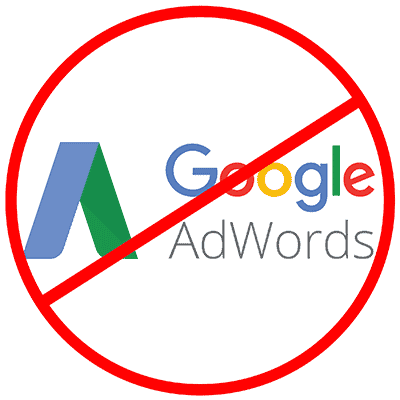
If this sounds familiar, not only will this post potentially save you money, it will also help you decide once and for all if you should even be using AdWords.
I have been managing AdWords accounts for our clients for more than 13 years now. And during this time, I have spotted a few scenarios where AdWords just doesn’t work, making it a complete waste of time and money. For example…
When no one is searching for whatever it is you’re offering.
If your prospective customers aren’t actively searching for your products or services, AdWords will most likely be an uphill battle, and a costly one at that.
At the core of AdWords, giving people what they’re looking for is fundamental to your success. If people aren’t looking for your offerings, it’s going to be hard to produce good results.
It’s true that AdWords is not only about a search. But without it, achieving success can be a difficult and a costly endeavor.
If this applies to your business, AdWords might not be for you.
When your offering is not so easy to explain.
I’m not suggesting that a complicated product has no place in AdWords.
Far from it!
I have managed many successful accounts that have offered various types of complicated products. What they each had in common was that there was a simple way to explain what they were about.
With AdWords, you’re fighting to be noticed, and you have no time (or space) to explain anything in detail.
If you struggle to explain to people what it is you’re offering, AdWords might not be a good fit for your business.
When your website is awful. Google knows it, and you don’t.
Have you ever watched someone use your website? It can be a rather painful experience.
You know your website so well that it can make you blind to its obvious problems.
If someone arrives on your website and the content they see doesn’t tie-in with the AdWords ad they just clicked on or the search they just performed, they will most likely leave.
And even when your website successfully explains whatever it is you’re offering, but your visitors consistently struggle to engage with it, that’s a problem.
We have all been on websites where we can’t find what we’re looking for. If this is happening to your visitors, they will most likely give up and leave.
If this is what most of your AdWords visitors are doing, Google will take notice, increase your cost per click and possibly stop showing your ads as often as you would like.
While this is a fixable issue, if you’re unwilling to fix it or you just don’t have the ability to notice this issue, AdWords is not a good idea.
When you’re too risk-averse.
When it comes to TV, radio, print, mail, billboards, or online pay-per-click advertising, AdWords is by far the least risky.
With AdWords, you have an incredible ability to hone in on your target audience, which is better than many other forms of advertising.
But AdWords is still not risk-free.
And you shouldn’t be swayed by Google’s propaganda.
For years, Google pushed the notion that you can easily track which ad clicks lead to desirable outcomes, like purchases. And by doing so, you can eliminate waste and improve on areas that produce good results. Google suggested that the use of their tracking system could potentially eliminate risk or reduce it to an almost-zero level. The problem is that this isn’t true.
Google’s tracking system is flawed because of how we use the Internet today.
One of the biggest impacts on our ability to accurately track is how we use multiple devices to interact with the web. For example, I might use my phone to research a product, only to purchase that product from my desktop computer. An advertiser would not be able to accurately tell that the ad clicked from a mobile device led to the purchase from a desktop computer.
Another issue is that, when multiple people are involved in the purchasing process, tracking is useless. If that occurs, there is no reliable way to connect the person that initially clicked on your ad to the person that ultimately made the purchase.
People are also becoming more aware of the implications of Google’s tracking, so they either clear their browser history or use tools that prevent trackers, and some browsers even limit the abilities of these trackers completely.
All of these issues lead to your inability to accurately track your true return on investment within your AdWords account. Sure, you might be able to track some data, but you will not be able to know how representative the data is. Are you able to track 5% or 90% of all the successful purchases?
You could have a situation where you have two campaigns, one that results in many trackable purchases and one that doesn’t. The campaign that doesn’t could potentially be the best performing campaign, but you just can’t see that because of the flaws in the AdWords tracking system.
If you’re extremely risk-averse and you’re using purchase tracking to gauge success, AdWords might not be a good idea.
When you don’t have the time to properly manage AdWords, or you aren’t prepared to have someone manage it for you.
Please don’t misunderstand me – you don’t have to have me manage your AdWords account! While that would be nice, you can certainly manage your own AdWords account yourself.
But you would need to spend the time on actually managing it.
Increasing or decreasing your bids here and there, or adding a few keywords and ads once every six months is not enough.
And if you think it’s okay to let Google set up and manage your AdWords account for you, think again.
Google has a completely different agenda from your own. Sure, there is some overlap, but Google’s success is not your success.
Effective AdWords management is about taking steps to improve performance every week, and it is detailed and in-depth. You are constantly monitoring and analyzing the performance of your campaigns. You’re eliminating items that are not producing good results, and you’re improving on items that are. You are continuously looking for new and different ways of targeting your prospective customers. You are regularly questioning each and every option Google gives you. You are constantly re-evaluating everything you do because there is always room for improvement.
If you don’t see that as an option for you or someone in your company, AdWords is probably not a good fit for your business.
The good news.
If after reading you conclude that AdWords is right for you but you need some additional help, try the following free items:
The AdWords cheat sheet – Not sure whether your AdWords account has been set up correctly? Wondering if you’re losing or making money from your AdWords account? This cheat sheet contains invaluable information.
How to cut costs in AdWords in less than one hour a week – our free PDF book. No registration required.
Unique ideas for your business
The Demystifier puts practical ideas into your hands. You won't find them elsewhere. Original, actionable and insanely effective.


